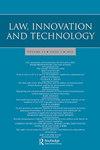Digitising legislation: connecting regulatory mind-sets and constitutional values
Q1 Social Sciences
引用次数: 2
Abstract
ABSTRACT Digitising legislation is an appealing concept, yet it raises a range of legal, regulatory and technological challenges. This article employs Brownsword’s ‘coherentist’, ‘regulatory-instrumental’ and ‘technocratic’ mind-sets to name and work through these challenges. We apply these mind-sets to illuminate diverse aspects of an attempt to convert select provisions of the Australian Consumer Data Right regime into computer code. This analysis shows that each mind-set highlights distinctive yet interconnected aspects of digitising legislation, underscoring the desirability of combining insights from all three mind-sets. Due to the constitutional backdrop against which legislation is created, interpreted and applied, rule of law and separation of powers values ought to shape and guide the constellation of mind-sets that applies. Overall, a divided legal and regulatory mind-set provides an incomplete picture of the challenges and opportunities associated with digitising legislation. Rather, we argue that a holistic regulatory mind-set, informed by overarching constitutional values, is critical in this context.立法数字化:将监管心态与宪法价值观联系起来
摘要数字化立法是一个很有吸引力的概念,但它带来了一系列法律、监管和技术挑战。这篇文章运用了Brownsword的“连贯主义者”、“监管工具”和“技术官僚”的思维定势来命名和应对这些挑战。我们运用这些思维方式来阐明将澳大利亚消费者数据权制度的部分条款转换为计算机代码的尝试的各个方面。这一分析表明,每一种心态都突出了数字化立法的独特但相互关联的方面,强调了将所有三种心态的见解结合起来的可取性。由于立法的制定、解释和适用的宪法背景,法治和分权价值观应该塑造和指导适用的心态。总的来说,法律和监管思维的分歧提供了与数字化立法相关的挑战和机遇的不完整画面。相反,我们认为,在这种情况下,以总体宪法价值观为基础的整体监管心态至关重要。
本文章由计算机程序翻译,如有差异,请以英文原文为准。
求助全文
约1分钟内获得全文
求助全文
来源期刊

Law, Innovation and Technology
Social Sciences-Law
CiteScore
4.50
自引率
0.00%
发文量
18
期刊介绍:
Stem cell research, cloning, GMOs ... How do regulations affect such emerging technologies? What impact do new technologies have on law? And can we rely on technology itself as a regulatory tool? The meeting of law and technology is rapidly becoming an increasingly significant (and controversial) topic. Law, Innovation and Technology is, however, the only journal to engage fully with it, setting an innovative and distinctive agenda for lawyers, ethicists and policy makers. Spanning ICTs, biotechnologies, nanotechnologies, neurotechnologies, robotics and AI, it offers a unique forum for the highest level of reflection on this essential area.
 求助内容:
求助内容: 应助结果提醒方式:
应助结果提醒方式:


